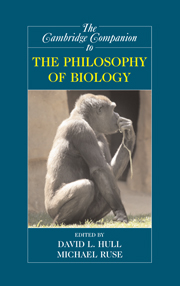Book contents
- Frontmatter
- 1 Adaptation
- 2 Population Genetics
- 3 Units and Levels of Selection
- 4 What’s Wrong with the Emergentist Statistical Interpretation of Natural Selection and Random Drift?
- 5 Gene
- 6 Information in Biology
- 7 Reductionism (and Antireductionism) in Biology
- 8 Mechanisms and Models
- 9 Teleology
- 10 Macroevolution, Minimalism, and the Radiation of the Animals
- 11 Philosophy and Phylogenetics: Historical and Current Connections
- 12 Human Evolution: The Three Grand Challenges of Human Biology
- 13 Varieties of Evolutionary Psychology
- 14 Neurobiology
- 15 Biological Explanations of Human Sexuality: The Genetic Basis of Sexual Orientation
- 16 Game Theory in Evolutionary Biology
- 17 What Is an ‘Embryo’ and How Do We Know?
- 18 Evolutionary Developmental Biology
- 19 Molecular and Systems Biology and Bioethics
- 20 Ecology
- 21 From Ecological Diversity to Biodiversity
- 22 Biology and Religion
- 23 The Moral Grammar of Narratives in History of Biology: The Case of Haeckel and Nazi Biology
- Reference List
- Index
- Series List
12 - Human Evolution: The Three Grand Challenges of Human Biology
Published online by Cambridge University Press: 28 April 2008
- Frontmatter
- 1 Adaptation
- 2 Population Genetics
- 3 Units and Levels of Selection
- 4 What’s Wrong with the Emergentist Statistical Interpretation of Natural Selection and Random Drift?
- 5 Gene
- 6 Information in Biology
- 7 Reductionism (and Antireductionism) in Biology
- 8 Mechanisms and Models
- 9 Teleology
- 10 Macroevolution, Minimalism, and the Radiation of the Animals
- 11 Philosophy and Phylogenetics: Historical and Current Connections
- 12 Human Evolution: The Three Grand Challenges of Human Biology
- 13 Varieties of Evolutionary Psychology
- 14 Neurobiology
- 15 Biological Explanations of Human Sexuality: The Genetic Basis of Sexual Orientation
- 16 Game Theory in Evolutionary Biology
- 17 What Is an ‘Embryo’ and How Do We Know?
- 18 Evolutionary Developmental Biology
- 19 Molecular and Systems Biology and Bioethics
- 20 Ecology
- 21 From Ecological Diversity to Biodiversity
- 22 Biology and Religion
- 23 The Moral Grammar of Narratives in History of Biology: The Case of Haeckel and Nazi Biology
- Reference List
- Index
- Series List
Summary
Man is but a reed, the weakest in nature, but he is a thinking reed.
Blaise Pascal, Pensées, number 347A SUMMARY OF THE ARGUMENT
Human biology faces three great research frontiers: ontogenetic decoding, the brain-mind puzzle, and the ape-to-human transformation. By ontogenetic decoding, or the egg-to-adult transformation, I refer to the problem of how the unidimensional genetic information encoded in the DNA of a single cell becomes transformed into a four-dimensional being, the individual that grows, matures, and dies. Cancer, disease, and aging are epiphenomena of ontogenetic decoding. By the brain-mind puzzle I refer to the interdependent questions of (1) how the physicochemical signals that reach our sense organs become transformed into perceptions, feelings, ideas, critical arguments, aesthetic emotions, and ethical values; and (2) how, out of this diversity of experiences, there emerges a unitary reality, the mind or self. Free will and language, social and political institutions, technology and art, are all epiphenomena of the human mind. By the ape-to-human transformation I refer to the mystery of how a particular ape lineage became a hominid lineage, from which emerged, over only a few million years, humans able to think and love, to develop complex societies and subject to ethical, aesthetic and other values. The human genome differs little from the chimp genome.
- Type
- Chapter
- Information
- The Cambridge Companion to the Philosophy of Biology , pp. 233 - 254Publisher: Cambridge University PressPrint publication year: 2007
- 3
- Cited by

